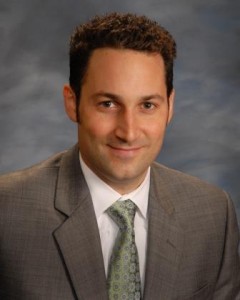Tom Sinas, Grand Rapids attorney, gives an overview of what SB 248 provides – and how it hurts Michigan consumers (but not insurance companies)
Once again, auto no-fault “reform” is on our minds, ever since the Michigan Senate passed SB 248 in whirlwind fashion late last week. The bill is now being considered by the House, which has scheduled a number of hearings to consider testimony on the proposals at issue.
Our no-fault team, including Grand Rapids auto accident attorney Tom Sinas, has been out in the forefront, making sure the people of  Michigan are aware of exactly how our current no-fault system will change if SB 248 is enacted. If you’re in the Grand Rapids area, you may have seen a segment on Fox 17 profiling Leo, one of Tom’s clients and an individual involved in a motorcycle accident – a direct beneficiary of our state’s very generous no-fault insurance system (watch the video below).
Michigan are aware of exactly how our current no-fault system will change if SB 248 is enacted. If you’re in the Grand Rapids area, you may have seen a segment on Fox 17 profiling Leo, one of Tom’s clients and an individual involved in a motorcycle accident – a direct beneficiary of our state’s very generous no-fault insurance system (watch the video below).
Leo fought for his no-fault benefits for well over a year. A few months after being involved in an accident that almost took his life, Leo’s no-fault carrier stopped paying for his medical expenses and wage loss, despite the fact that he was recovering from a severe, traumatic brain injury, needed intense therapy, and was unable to work. Leo had to hire a lawyer in order to receive the benefits he should have received in the first place, and while a settlement was reached, his tale is not an isolated incident.
As mentioned by Tom Sinas, SB 248 provides no guarantees that consumers will be protected from insurance companies that fail to provide no-fault benefits in cases where they are warranted. The bill in its current form, however, does reduce the benefits accident victims and their caregivers receive . . . without explicitly providing that premiums are reduced as well. While the bill calls for the creation of a “fraud authority,” focus is only placed on fraud allegedly perpetrated by auto accident survivors, not fraudulent behavior insurance companies engage in by deciding, for no reason, to stop paying benefits, as they did in Leo’s case. If fraud is to be combated, the door should swing both ways.
In another segment, attorney Tom Sinas participated in a conversation with the Executive Director of the Insurance Institute of Michigan (IIM), Peter Kuhnmuench on WTCM NewsTalk 580 about SB 248. There, Tom made a number of points clear:
- The Senate Bill presents the “same thing, different day” – yet another of many attempts to “reform” the no-fault system without truly understanding and appreciating the implications of the proposed changes;
- There are no guaranteed rate reductions, but there will certainly be reductions in the benefits received by catastrophically injured accident victims, as seen through the reduced reimbursements to medical providers and a cap placed on the hourly rate paid to family members who care for their loved ones at home;
- The MCCA will be dissolved, making it unclear what will happen to its $18 billion in reserves;
- The proposed MCCC (MC3) which will replace the MCCA will be the new entity that catastrophically injured people deal with exclusively, as opposed to their insurance companies
- The proposed “fraud authority” only focuses on one side of the issue (consumer-based fraud), and does nothing to protect consumers against insurance companies abusing the system (as in Leo’s case).
In response, the IIM’s Executive Director addressed the issues by claiming that the goal is to “bring down rates” and enact “common sense reforms.” He claimed that there are already mechanisms in place to combat fraud perpetrated by insurance companies, namely in Chapter 20 of the Insurance Code. However, as Tom aptly pointed out, private lawsuits against these companies are not permitted under Chapter 20; so, how can consumers fight back? Further, if insurance companies truly wish for rates to decrease, would it not make sense to include such a provision in the legislation, instead of relying on the “free market” to bring the rates down?
All told, it looks like there are a number of things that are “guaranteed” under this bill, and none of it is promising for consumers. We encourage everyone to learn as much as they can about SB 248. Contact your representatives to let them know how you feel. Any changes that are made to the no-fault system as we currently know it must be done thoughtfully and carefully. Anything less is irresponsible governance and a disservice to the people of Michigan.

To whom it may concern,
Through this process of passing sb248. How long do I have before it’s official if passed? I depend on the auto no fault insurance to pay medical bills. I’m currently in the middle of therapy that includes expensive testing and therapy. I need to know if I need to move quickly for some of my testing while I have the existing auto no fault policy? Will no fault auto have to pay providers under the existing auto policy before its changed, if changed?
Thank You for your time!!!!!!
Sincerely,
Sheri Labatsky
Hi Sheri,
Thanks for your questions and comments. Right now, the future is unknown. The bill was voted out of the House Insurance Committee and is now on the House floor. There may be a number of amendments to clarify some of the issues you’ve raised. We also don’t know when this bill, if it becomes law, will take effect. So, unfortunately, we have to wait and see. Thanks for visiting our blog, and feel free to contact us if you have other questions.